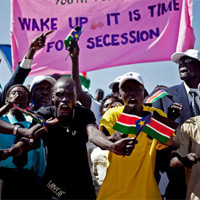
Summary
The establishment of strong democratic institutions and processes in Sudan will be a key prerequisite for lasting peace in Darfur, and throughout all of Sudan. The Comprehensive Peace Agreement (CPA) seeks to build the foundations for democratic processes and institutions, but the clock is ticking on the timetable set forth in the CPA, and three major milestones critical to the implementation of the CPA must be met over the next three years: 1) the population census in April 2008; 2) the national elections by July 2009; and 3) a self-determination referendum for Southern Sudan by March 2011. There must be penalties for non-compliance with the CPA timetable, such as targeted sanctions put forth by the U.N. Security Council against officials who are most responsible for obstructing the
implementation of the CPA.
Milestone #1: The 2008 Census
A national census is directly linked to the elections because it will reevaluate the population ratio based on Sudan’s current demography, and it will provide the basis for determining constituencies and voter registration. Again and again, the ruling National Congress Party (NCP) has derailed the census from the CPA mandated date of July 2007, and it is currently scheduled for April 2008. It must not be delayed anymore because the rainy season will prevent the census team from gaining full access to Southern Sudan.
The international community can help to ensure that the census is successful by providing sufficient numbers of qualified international observers of the census.
Milestone #2: The 2009 Election
The election has the potential to reshape the distribution of political power at all levels of governance in Sudan. The immediate requirement for a sound election is for the National Assembly to pass an election law that meets international standards. This bill failed to pass on the scheduled date in December 2007. Even if the bill passes in January 2008, the National Electoral Commission will only have one year to accomplish an extensive list of preparations. The elections must be held before the rainy season to ensure that all Sudanese are able to vote. Another practical issue is that the underdeveloped infrastructure will pose a massive and expensive logistical challenge to conducting the elections.
Milestone #3: The 2011 Self-Determination Referendum
The premise of the CPA is that all parties will work to “make unity attractive,” thereby increasing the likelihood that Southerners would vote for unity, but given that the war was fought principally in the South and Southerners were the primary victims of a conflict that killed 2 million people, the burden to make unity attractive rests overwhelmingly with the NCP. The NCP could take a number of stops to make unity more attractive:
- Genuine power sharing in the Government of National Unity
- Provide a real solution to the Darfur crisis
- Ensure free and fair elections
- Demonstrate that resources like oil will yield gains for all of Sudan
- Faithfully implement the CPA
The NCP has taken steps to signal that genuine unity is impossible, by thwarting the implementation of the CPA, by its actions in Darfur, by its handling of oil resources, and by its rejection of the Abyei Boundaries Commission’s findings.
Keeping the Democratic Transformation on Track
The credibility of the census, the election, and the referendum—if carried out openly, transparently, and honestly—will demonstrate whether the NCP is committed to a truly united Sudan based on
equality and respect. Thus far, the NCP has not demonstrated that commitment.
It will be up to the citizens of Southern Sudan to cast their vote in the referendum on whether unity has been made attractive. Those votes will create a new Sudan—in either one or two parts—that will be born of the people, by the people, and for the people.
Therein lies the power—and the promise—of the CPA. Whether this promise is realized depends in large part on the international community’s support for the census, the election, and the selfdetermination referendum.

